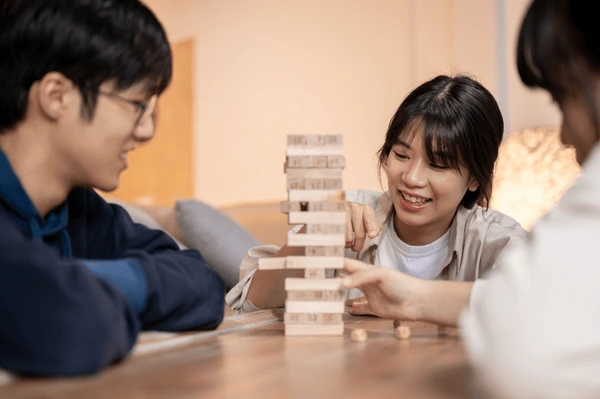As an adult, when was the last time you played? What does it even mean to play as an adult? Let’s start by defining what play is. Play is any activity that brings joy, engages your imagination, and allows you to be fully present in the moment. It is common as adults to think of play as a distant memory—a thing of past childhood, reserved for kids on playgrounds, playing dress-up, or running around being silly. As we grow older, responsibilities pile up: careers, bills, relationships, and societal expectations take center stage. The idea of "play" can feel frivolous, unproductive, or even embarrassing, especially to adults with bills to pay and families to support. But what if I told you that reclaiming the art of play could be one of the most helpful acts of self-care and an investment for your physical and mental health? Play isn’t just for kids, it’s a necessary human need that persists throughout our lives.
As children, play was our primary language of self-expression, the way we explored our world, picked up skills, and connected with others. Through play, we learned creativity, problem-solving, and resilience. But somewhere along the way, society convinced us that play is incompatible with adulthood. We were taught that productivity and seriousness are the markers of success in adulthood, while play is seen as a “waste of time". As a result, many adults have forgotten how to play—or feel guilty when they do play. As a mental health counsellor, I hear this far too often with parents and individuals in the safety of the therapy room. I hear the shame and guilt parents feel when they share that they do not know how to connect with their children through play, especially when it comes to make-believe play that draws on their imaginative skills. Yet, the absence of play in our lives can lead to increased stress, burnout, and a sense of numbness or feeling unable to experience a full range of emotions. It’s time we revisit what play can look like in our lives… for our mental health!
It might be helpful to clear up some misconceptions about play. Did you know that play as adults is not limited to toys alone, and does not need to be expensive either? It can be as simple as lying down on the grass at the park and figuring out the shapes of clouds that roll by. Research shows us that play has profound benefits for mental health:
1. Stress Reduction: Play triggers the release of endorphins, the body’s natural feel-good chemicals. It helps lower cortisol levels, reducing stress and promoting relaxation, thus improving our overall wellbeing.

2. Enhanced Creativity: Play encourages us to get curious - to think outside the box, fostering creativity and innovation. It allows us to approach problems with a fresh perspective. As Stuart Brown, founder of the National Institute for Play, famously said, “Play is the gateway to vitality. It opens our minds, fosters creativity, and helps us adapt to change.” Vitality refers to a state of being strong, active, and energetic; a state of liveliness.
3. Improved Relationships: Playful interactions can strengthen bonds with others, whether through shared laughter, games, or lighthearted moments. A study in the Journal of Social and Personal Relationships found that couples who engage in playful activities together report higher levels of relationship satisfaction (Aune & Wong, 2002).

4. Emotional Resilience: Play helps us process emotions and cope with challenges in a low-stakes, joyful way. According to psychiatrist Dr. Stuart Brown, “Play is a powerful catalyst for positive socialization and emotional resilience.” In jobs like being fire fighters and those in the police force, play in the form of humor and jokes can lighten situations that come with hazards of the job. For example, officers might use playful nicknames for each other based on traits or habits–like calling a colleague “Encik GPS” who always knows the fastest route. In police academy training, instructors may use exaggerated role-play or humorous scenarios to teach conflict resolution–like pretending to be a very dramatic mak cik during a mock domestic dispute call.
5. Increased Joy and Fulfillment: Play reminds us of the simple pleasures in life, helping us reconnect with our sense of wonder and joy, which can reduce our stress levels as well. Research from the Journal of Positive Psychology highlights that engaging in playful activities can boost happiness and life satisfaction (Proyer, 2014). In Malaysia, karaoke is an activity that most of us actively partake in, knowing well enough that we do not need to be able to sing to participate and have fun. We learn to appreciate seeing a different side of friends or acquaintances that we do not normally get to see in the office. What if we brought that sense of playfulness and lightness we may feel during karaoke with others, to the confines of our car while stuck in bottleneck traffic? It may make the journey more bearable.
Sometimes, you may not even realise that a big chunk of time has passed when you enjoy the activity you’re engaged in, like painting by numbers for example. It gets you fully absorbed into doing what you enjoy without setting a goal, rules, or expectations about the outcome. Psychologist Csikszentmihalyi described this feeling as being in a state of “flow”. It’s about letting go of self-consciousness and embracing a spirit of curiosity and fun.
Here are some ideas to inspire you:
- Creative Outlets: Painting, writing, dancing, or playing music.
- Games: Board games, card games, video games, or puzzles.
- Physical Play: Yoga, hiking, dancing, or even jumping on a trampoline.
- Social Play: Hosting a game night, joining a sports league, or simply goofing around with friends.
- Solo Play: Building something, gardening, or exploring a new hobby.
- Imaginative Play: Daydreaming, storytelling, or role-playing games.
The key is to choose activities that feel fun and freeing, not obligatory or performance-driven.
For many adults, the idea of play can feel uncomfortable or even intimidating, when in a group setting. Here are some common barriers and how to overcome them:
1. "I don’t have time." Start small. Even 10 minutes of playful activity can make a difference.
2. "I’ll look silly." Remind yourself that play is for you, not for anyone else’s approval. As Brené Brown, renowned researcher and author, says, “Play is a vital part of wholehearted living. It’s not about being perfect; it’s about being present.”
3. "It’s not productive." Play is inherently valuable for your mental health—it doesn’t need to serve a purpose beyond joy. Start noticing how your body feels when you dedicate even 10minutes a day to intentionally doing something for the fun of it.
4. "I’ve forgotten how." Start by observing children or recalling what brought you joy as a kid.
Incorporating play into your life isn’t just about having fun—it’s about reclaiming a part of yourself that may have been buried under the weight of adulthood. It’s about giving yourself permission to experience joy, curiosity, and connection. Play isn’t just a luxury; it’s a necessity. Let’s bring it back into our lives, one joyful moment at a time.
So, what are you waiting for? Go ahead—dance in your living room, build a pillow fort, or try that hobby you’ve been curious about. Your inner child (and your mental health) will thank you.

© Rekindle Sdn. Bhd., 2025. Unauthorized use and/or duplication of this material without express and written permission from the author and/or owner is strictly prohibited. Excerpts and links may be used, provided that full and clear credit is given to Rekindle Centre for Systemic Therapy and www.rekindletherapy.com with appropriate and specific direction to the original content.